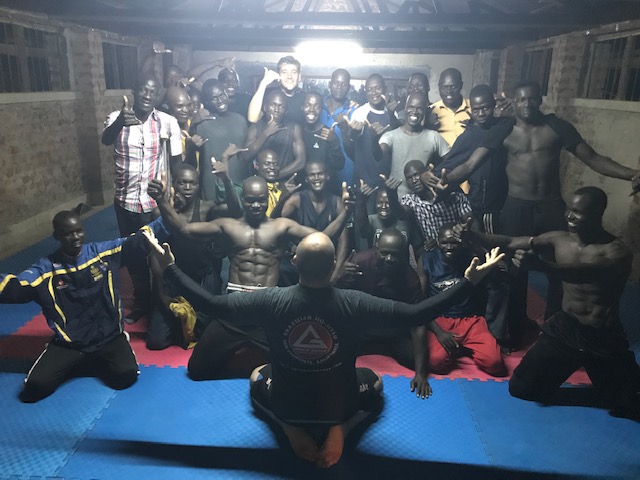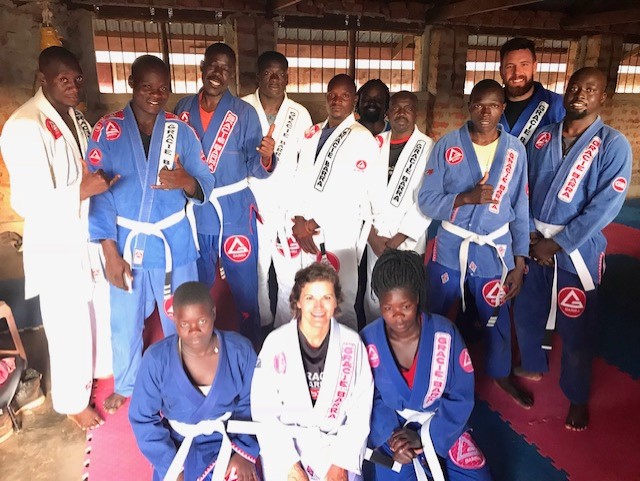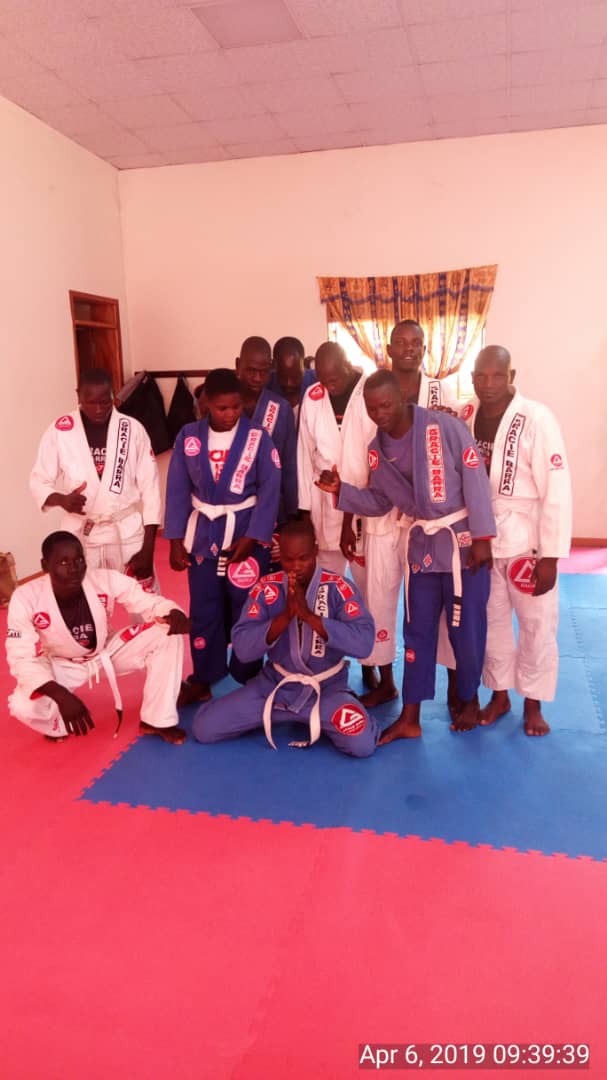Gracie Barra Jiu-jitsu Social Project in Uganda
Meet John Koeshall, a Gracie Barra student who is passionate about jiu-jitsu and helping others through sharing the art.
ㅤ
John and his wife started a GB school in Uganda, Africa and shares his interesting story about the challenges and rewards of sharing jiu-jitsu with people in a different part the world.

ㅤ
GB: Let’s begin by sharing your experience in Jiu-Jitsu with the Gracie Barra readers. When did you get started training Jiu-Jitsu and where is your home Gracie Barra school?
ㅤ
John Koeshall: I had the great pleasure of accidentally (or providentially) finding my way into Professor Flavio Almeida’s school when it was first opening in San Clemente, Ca. I was training in another style of martial arts and my instructor had suggested that I needed to train Jiu-Jitsu, as my ground game was fairly non-existent. I was in Orange County, California and exited off of I-5 to stop at a Starbucks, when I saw a sandwich sign advertising a new Gracie Barra school opening in San Clemente. I thought I’d call the number listed, and when I did the man on the line gave me directions to the school. I made an appointment for an intro class the next day. When I arrived, I was met by a couple of imposing but very friendly gentlemen. Professor Flavio Almeida and (then his program director) Professor Felipe Guedes. That day was the start of my journey into the beauty of Jiu-Jitsu and my love for Gracie Barra. I think I was one of the first 20 or so students to sign up!. Even though I have traveled around the world (and don’t currently live in California) Professor Felipe Guedes and Professor Flavio Almeida are my professors. GB San Clemente is my home school.
ㅤ
GB: You started the first Gracie Barra school in Uganda. How did you find yourself in Uganda and how did the idea to start a school originate?
ㅤ
John Koeshall: Actually…we started the first Jiu-Jitsu school in Uganda….and it is Gracie Barra! My wife and I went to Uganda to work with a NGO that my sister and brother-in-law started. As I wanted to be able to continue my training, I asked my brother-in-law about the possibility of me teaching some local guys. He thought that sounded like a good idea! When we arrived in Gulu, Uganda my brother-in-law arranged a meeting with some government officials, unbeknownst to me he had told them that I taught martial arts. (I was told later, because of their violent and volatile history, martial arts are strictly forbidden unless sanctioned by the government. At that time only boxing, kickboxing, and tae kwon do were recognized in the country.) Within a short time a motorcade arrived where we were staying and in walked a procession of very serious looking men…including the head of the police for the district, the highest elected official in northern Uganda, the city mayor, and the President of Uganda’s security adviser had all come to question me about what I intended to teach their people. They did not know what Jiu-Jitsu was and said, “We do not want you raising a new army of rebels here in Gulu!” I quickly explained that Jiu-Jitsu was a new sport to their country, but it was well known around the world and growing in popularity worldwide. I believe it would be a help to their society as it would teach many life lessons that their people needed. I told them how it would help their young people have a positive purpose and outlet which they could commit themselves to.
ㅤ
They wanted to see what it was for themselves, so we scheduled a short demo class for the next day. Needless to say, the three who came (mayoral candidate, top elected official, and a highly respected TKD coach who is on the national Olympic committee) loved it. From that day, I taught six days a week. Within 2 weeks we had over 30 regularly attend each class. Within a month we had 300 on a waiting list to begin training, and I was teaching morning and night. Currently there are just over 30 who are still training 7 days/week…morning and night. Yes, 14 classes per week. ㅤ
ㅤ
 ㅤ
ㅤGB: Tell us about the location of the school, the classes and most importantly, how are the students enjoying learning Jiu-Jitsu? What has been the positive effect of training Jiu-Jitsu on their lives?
ㅤ
John Koeshall: The location is in the building being used by the TKD team in Gulu. It is a space roughly 18′ x 36′ made of rough brick and wood. We have a cement floor with 10 year old 0.5 inch puzzle mats. There are no glass panes in the “windows” but instead there are steel bars over the “windows”. Originally this building was built to lock children in at night so the terrorists led by General Kony and the LRA could not abduct them from their homes while they slept. The kids were locked in each night and let out each morning. Some of the young men in the school grew up hiding in that building. You’ll be able to find functioning lights there only sometimes, but you’ll always find good attitudes and hard work.
ㅤ
The core team has been training over two years now. THEY LOVE IT! Even though I am not there all of the time, they are in contact with me multiple times each week. They major on the basics of the GB curriculum.
ㅤ
Their lives are hard. They train before dawn, work all day in manual labor jobs, and then come together to train after dark. Sometimes there is power for light, sometimes there is not. Many times our classes were held by the light of my cellphone. Other times, it was just dark. They credit Jiu-Jitsu with giving them something to look forward to and something they can dedicate themselves to. Their commitment challenges me daily.
ㅤ
This November (2019), 7 of the athletes traveled 6 hrs (one way) to compete in the 2nd annual Ugandan BJJ championship. They took 10 medals and the team trophy! A black belt from Brazil has opened a school in Kampala, and he reached out to congratulate me for how well our guys represented themselves and GB. I am VERY proud of them!
ㅤ
GB: What are the special challenges of starting a Jiu-Jitsu school in a place like Uganda?
ㅤ
John Koeshall: There have been and will continue to be challenges. One of the biggest challenges for me was lack of resources. Basic needs going unmet cause people to see things differently. When starting a school or social project in areas like this, we need to understand their culture and expectations of us when we come in and try to “help” them. Many things we do with wonderful intentions can result in long-term detrimental results. Personal dignity is important and we have to be careful that we are not paternalistic in our approach to “Jiu-Jitsu For Everyone”.
ㅤ
Another challenge is in creating the appropriate culture. In a place which doesn’t necessarily follow our rules or ideals, we have to be very intentional in how we recreate and propagate the GB culture. I believe creating the Gracie Barra culture is the best thing to do for these schools, but I also recognize that it will be challenged and ultimately instituted differently in a place which is so far removed from our western culture. I am still learning (frequently) that this is the case. However, it is very rewarding to see the GB culture emerge in a new place!

ㅤ
GB: What are your plans and goals for the future of your GB school in Uganda?
ㅤ
John Koeshall: When we originally started the school, I had dreams of developing it into a Premium GB location. After 18 months I came to realize that was not a realistic goal ….yet. The area of Uganda, the current culture there, and the overall lack made it a better idea to keep it a GB social project. I fully believe in the future these champions can be Jiu-Jitsu leaders and Jiu-Jitsu entrepreneurs. However there is much education that needs to happen, much support that is needed, and they need to learn to step up into these roles. This process takes time. Years. Currently there is an overall feeling that they need support and they cannot succeed without someone giving them everything. This is what the “aid culture” has taught them. I am trying to help them not only grow in their Jiu-Jitsu, but also as leaders so that they can lead their own people.
ㅤ
GB: Do you want to give a shout out to any sponsors or supporters that assisted in your Jiu-Jitsu social project? How can people who want to know more or help out find out more information?
ㅤ
John Koeshall: Absolutely! I need to thank my Professors first. They have given me wisdom, advise, support, and encouragement through this whole process. I would also like to thank Professor Marco Joca and all the folks at GB Wear for the gear and support they have shown us from the beginning of the project. I would also like to thank the incredible GB teams from San Clemente, California and Dana Point, California who have selflessly donated used gear to the team in Uganda. I would like to thank my family from World Embrace in Uganda who have helped to support us and the school from its inception. Lastly, I need to thank my wife. She believes in the dream as much as I do, and is equally committed to the vision of Jiu-Jitsu for Everyone and Equipe GB!
ㅤ
We ALWAYS are grateful for any help people wish to give. 🙂 Monetary donations (tax deductible) go towards transporting donated gear to them and to help them go to competitions as a team. All gear is appreciated as it is quite impossible for them to afford anything themselves at this time. However, I hesitate to take gear that is too beat up. While they would take it gladly, I don’t want to give them the feeling that they’re a charity project….I want them to feel that they are a valued part of our international team. I also would love to host GB coaches/professors who would be interested in traveling to Uganda to help teach! I am going to be there in the end of February for a 7 day camp leading up to the 2nd annual East African BJJ Championships and then I will coach the athletes at the tournament on February 29th in Kampala. Fancy a trip to East Africa?
ㅤ
Contact me via email: jdkoeshall@gmail.com or hit me up on Facebook.
ㅤ
Faecbook: www.facebook.com/EABJJProject
ㅤ
See also on Gracie Barra : Is Strength Important in Bjj?
ㅤ
Credits: Mark Mullen
Gracie Barra Black belt based in Asia
